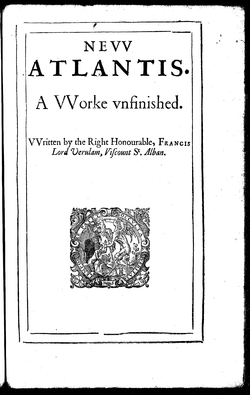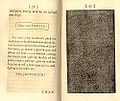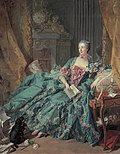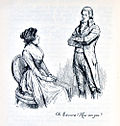E. F. Benson
The Novels Portal

A novel is an extended work of narrative fiction usually written in prose and published as a book. The word derives from the Italian: novella for "new", "news", or "short story (of something new)", itself from the Latin: novella, a singular noun use of the neuter plural of novellus, diminutive of novus, meaning "new". According to Margaret Doody, the novel has "a continuous and comprehensive history of about two thousand years", with its origins in the Ancient Greek and Roman novel, Medieval Chivalric romance, and the tradition of the Italian Renaissance novella. The ancient romance form was revived by Romanticism, in the historical romances of Walter Scott and the Gothic novel. Some novelists, including Nathaniel Hawthorne, Herman Melville, Ann Radcliffe, and John Cowper Powys, preferred the term "romance". Such "romances" should not be confused with the genre fiction romance novel, which focuses on romantic love. M. H. Abrams and Walter Scott have argued that a novel is a fiction narrative that displays a realistic depiction of the state of a society, while the romance encompasses any fictitious narrative that emphasizes marvellous or uncommon incidents. Works of fiction that include marvellous or uncommon incidents are also commonly called novels, including Mary Shelley's Frankenstein, J. R. R. Tolkien's The Lord of the Rings, and Harper Lee's To Kill a Mockingbird.
The spread of printed books in China led to the appearance of the vernacular classic Chinese novels during the Ming dynasty (1368–1644), and Qing dynasty (1616–1911). An early example from Europe was Hayy ibn Yaqdhan by the Sufi writer Ibn Tufayl in Muslim Spain. Later developments occurred after the invention of the printing press. Miguel de Cervantes, author of Don Quixote (the first part of which was published in 1605), is frequently cited as the first significant European novelist of the modern era. Literary historian Ian Watt, in The Rise of the Novel (1957), argued that the modern novel was born in the early 18th century.
Recent technological developments have led to many novels also being published in non-print media: this includes audio books, web novels, and ebooks. Another non-traditional fiction format can be found in graphic novels. While these comic book versions of works of fiction have their origins in the 19th century, they have only become popular recently. (Full article...)
Le Père Goriot is an 1835 novel by French novelist and playwright Honoré de Balzac, included in the Scènes de la vie privée section of his novel sequence La Comédie humaine. Widely considered as Balzac's most important novel, it marks the first serious use by the author of characters who had appeared in other books, a technique that distinguishes Balzac's fiction and makes La Comédie humaine unique among bodies of work. It is also noted as an example of his realist style, using minute details to create character and subtext. Set in Paris in 1819, Le Père Goriot follows the intertwined lives of three characters: the elderly doting Goriot; a mysterious criminal-in-hiding named Vautrin; and a naive law student named Eugène de Rastignac. The story takes place during the Bourbon Restoration, which brought about profound changes in French society; the struggle of individuals to secure upper-class status is ubiquitous in the book. The novel was released to mixed reviews. Some critics praised the author for his complex characters and attention to detail; others condemned him for his many depictions of corruption and greed. A favorite of Balzac's, the book quickly won widespread popularity and has often been adapted for film and the stage.
Selected novel quote

- In past ages, a war, almost by definition, was something that sooner or later came to an end, usually in unmistakable victory or defeat.In the past, also, war was one of the main instruments by which human societies were kept in touch with physical reality. All rulers in all ages have tried to impose a false view of the world upon their followers, but they could not afford to encourage any illusion that tended to impair military efficiency. So long as defeat meant the loss of independence, or some other result generally held to be undesirable, the precautions against defeat had to be serious. Physical facts could not be ignored. In philosophy, or religion, or ethics, or politics, two and two might make five, but when one was designing a gun or an aeroplane they had to make four. Inefficient nations were always conquered sooner or later, and the struggle for efficiency was inimical to illusions. Moreover, to be efficient it was necessary to be able to learn from the past, which meant having a fairly accurate idea of what had happened in the past. Newspapers and history books were, of course, always coloured and biased, but falsification of the kind that is practiced today would have been impossible. War was a sure safeguard of sanity, and so far as the ruling classes were concerned it was probably the most important of all safeguards. While wars could be won or lost, no ruling class could be completely irresponsible.
Did you know...
- ...that the romantic epistles Letters of a Portuguese Nun were from a nun to her lover?
- ...that some elements of the Jules Verne adventure story Two Years' Vacation are to be found in William Golding's Lord of the Flies, written 66 years later?
- ...that the Viagens Interplanetarias series of science fiction stories by L. Sprague de Camp was influenced by Edgar Rice Burroughs' Martian novels?
General images
Subcategories
Featured content
Featured articles
 Ace Books
Ace Books All God's Children Need Traveling Shoes
All God's Children Need Traveling Shoes The All-Story Magazine
The All-Story Magazine A Beautiful Crime
A Beautiful Crime Big Two-Hearted River
Big Two-Hearted River Boenga Roos dari Tjikembang (novel)
Boenga Roos dari Tjikembang (novel) The Bread-Winners
The Bread-Winners Brother Jonathan (novel)
Brother Jonathan (novel) Burger's Daughter
Burger's Daughter Candide
Candide Casino Royale (novel)
Casino Royale (novel) Chitty-Chitty-Bang-Bang
Chitty-Chitty-Bang-Bang A Christmas Carol
A Christmas Carol The Coral Island
The Coral Island Cousin Bette
Cousin Bette The Day Before the Revolution
The Day Before the Revolution Len Deighton
Len Deighton Diamonds Are Forever (novel)
Diamonds Are Forever (novel) The Diary of a Nobody
The Diary of a Nobody Doc Savage (magazine)
Doc Savage (magazine) Dr. No (novel)
Dr. No (novel) Dracula
Dracula Drama dari Krakatau
Drama dari Krakatau Dreamsnake
Dreamsnake Farseer trilogy
Farseer trilogy For Your Eyes Only (short story collection)
For Your Eyes Only (short story collection) The Fountainhead
The Fountainhead The Fox and the Hound (novel)
The Fox and the Hound (novel) From Russia, with Love (novel)
From Russia, with Love (novel) The General in His Labyrinth
The General in His Labyrinth Gods' Man
Gods' Man Goldfinger (novel)
Goldfinger (novel) The Good Terrorist
The Good Terrorist The Great Gatsby
The Great Gatsby The Green Child
The Green Child Halo: Contact Harvest
Halo: Contact Harvest The Halo Graphic Novel
The Halo Graphic Novel A Handful of Dust
A Handful of Dust The Historian
The Historian Hogwarts Express (Universal Orlando Resort)
Hogwarts Express (Universal Orlando Resort) The Hunger Games (novel)
The Hunger Games (novel) I Know Why the Caged Bird Sings
I Know Why the Caged Bird Sings In Our Time (short story collection)
In Our Time (short story collection) Indian Camp
Indian Camp Irish Thoroughbred
Irish Thoroughbred Jonathan Strange & Mr Norrell
Jonathan Strange & Mr Norrell Lad, A Dog
Lad, A Dog The Left Hand of Darkness
The Left Hand of Darkness Live and Let Die (novel)
Live and Let Die (novel) Logan (novel)
Logan (novel) Louis Lambert (novel)
Louis Lambert (novel) The Man in the Moone
The Man in the Moone The Man with the Golden Gun (novel)
The Man with the Golden Gun (novel) Mom & Me & Mom
Mom & Me & Mom The Monster (novella)
The Monster (novella) Moonraker (novel)
Moonraker (novel) Naruto
Naruto Night (memoir)
Night (memoir) Octopussy and The Living Daylights
Octopussy and The Living Daylights On Her Majesty's Secret Service (novel)
On Her Majesty's Secret Service (novel) The Open Boat
The Open Boat The Ordeal of Gilbert Pinfold
The Ordeal of Gilbert Pinfold Paradises Lost
Paradises Lost Pattern Recognition (novel)
Pattern Recognition (novel) La Peau de chagrin
La Peau de chagrin The Penelopiad
The Penelopiad Père Goriot
Père Goriot The Phantom Tollbooth
The Phantom Tollbooth The Portage to San Cristobal of A.H.
The Portage to San Cristobal of A.H. Rachel Dyer
Rachel Dyer Raptor Red
Raptor Red Reception history of Jane Austen
Reception history of Jane Austen The Red Badge of Courage
The Red Badge of Courage J. K. Rowling
J. K. Rowling El Señor Presidente
El Señor Presidente Seventy-Six (novel)
Seventy-Six (novel) A Song Flung Up to Heaven
A Song Flung Up to Heaven Southern Cross (wordless novel)
Southern Cross (wordless novel) The Spy Who Loved Me (novel)
The Spy Who Loved Me (novel) Starship Troopers
Starship Troopers The Sun Also Rises
The Sun Also Rises The Temple at Thatch
The Temple at Thatch Thunderball (novel)
Thunderball (novel) The Time Traveler's Wife
The Time Traveler's Wife To Kill a Mockingbird
To Kill a Mockingbird True at First Light
True at First Light Uncle Tom's Cabin
Uncle Tom's Cabin Vision in White
Vision in White Emma Watson
Emma Watson A Wizard of Earthsea
A Wizard of Earthsea Wordless novel
Wordless novel You Only Live Twice (novel)
You Only Live Twice (novel) Z. Marcas
Z. Marcas
Featured lists
 List of Alien (franchise) characters
List of Alien (franchise) characters Aurealis Award for Best Horror Novel
Aurealis Award for Best Horror Novel Aurealis Award for Best Science Fiction Novel
Aurealis Award for Best Science Fiction Novel Aurealis Award for Best Fantasy Novel
Aurealis Award for Best Fantasy Novel Aurealis Award for Best Young Adult Novel
Aurealis Award for Best Young Adult Novel List of works by John Buchan
List of works by John Buchan List of Charmed novels and short stories
List of Charmed novels and short stories List of works by Leslie Charteris
List of works by Leslie Charteris Winston Churchill as a writer
Winston Churchill as a writer Roald Dahl bibliography
Roald Dahl bibliography Len Deighton bibliography
Len Deighton bibliography Arthur Conan Doyle bibliography
Arthur Conan Doyle bibliography The Flashman Papers
The Flashman Papers List of works by H. Rider Haggard
List of works by H. Rider Haggard List of Harry Potter cast members
List of Harry Potter cast members List of works by Georgette Heyer
List of works by Georgette Heyer List of works by E. W. Hornung
List of works by E. W. Hornung Hugo Award for Best Novel
Hugo Award for Best Novel Hugo Award for Best Novelette
Hugo Award for Best Novelette Hugo Award for Best Novella
Hugo Award for Best Novella Hugo Award for Best Short Story
Hugo Award for Best Short Story List of James Bond novels and short stories
List of James Bond novels and short stories John W. Campbell Memorial Award for Best Science Fiction Novel
John W. Campbell Memorial Award for Best Science Fiction Novel List of works by W. E. Johns
List of works by W. E. Johns List of works by Kwee Tek Hoay
List of works by Kwee Tek Hoay Lambda Literary Award for Speculative Fiction
Lambda Literary Award for Speculative Fiction List of awards and nominations received by J. K. Rowling
List of awards and nominations received by J. K. Rowling List of works by W. Somerset Maugham
List of works by W. Somerset Maugham List of works by H. C. McNeile
List of works by H. C. McNeile Nebula Award for Best Novella
Nebula Award for Best Novella Nebula Award for Best Novel
Nebula Award for Best Novel Newbery Medal
Newbery Medal List of Nobel laureates in Literature
List of Nobel laureates in Literature List of Women's Prize for Fiction winners
List of Women's Prize for Fiction winners George Orwell bibliography
George Orwell bibliography List of works by Sax Rohmer
List of works by Sax Rohmer List of works by Dorothy L. Sayers
List of works by Dorothy L. Sayers Theodore Sturgeon Award
Theodore Sturgeon Award P. G. Wodehouse bibliography
P. G. Wodehouse bibliography World Fantasy Award—Anthology
World Fantasy Award—Anthology World Fantasy Award—Collection
World Fantasy Award—Collection World Fantasy Award—Novella
World Fantasy Award—Novella World Fantasy Award—Novel
World Fantasy Award—Novel World Fantasy Award—Short Fiction
World Fantasy Award—Short Fiction World Fantasy Special Award—Non-professional
World Fantasy Special Award—Non-professional
Featured portals
Featured pictures
 File:Alfons Mucha - 1896 - La Dame aux Camélias - Sarah Bernhardt.jpg
File:Alfons Mucha - 1896 - La Dame aux Camélias - Sarah Bernhardt.jpg File:Archibald Standish Hartrick - Rudyard Kipling - Soldier Tales 18 - The Taking of Lungtungpen 1.jpg
File:Archibald Standish Hartrick - Rudyard Kipling - Soldier Tales 18 - The Taking of Lungtungpen 1.jpg File:Archibald Standish Hartrick - Rudyard Kipling - Soldier Tales 19 - The Taking of Lungtungpen 2.jpg
File:Archibald Standish Hartrick - Rudyard Kipling - Soldier Tales 19 - The Taking of Lungtungpen 2.jpg File:Hall Another World and Yet the Same 1607 Cornell CUL PJM 1009 01.jpg
File:Hall Another World and Yet the Same 1607 Cornell CUL PJM 1009 01.jpg File:Jules-Joseph Lefebvre, Graziella, The Metropolitan Museum of Art.jpg
File:Jules-Joseph Lefebvre, Graziella, The Metropolitan Museum of Art.jpg File:N. M. Price - Sir Walter Scott - Guy Mannering - At the Kaim of Derncleugh.jpg
File:N. M. Price - Sir Walter Scott - Guy Mannering - At the Kaim of Derncleugh.jpg File:William Hatherell - Robert Louis Stephenson - The Bottle Imp 1.jpg
File:William Hatherell - Robert Louis Stephenson - The Bottle Imp 1.jpg File:William Hatherell - Robert Louis Stephenson - The Bottle Imp 2.jpg
File:William Hatherell - Robert Louis Stephenson - The Bottle Imp 2.jpg
Things you can do

|
|
Related portals
WikiProjects
- Main projects
- Arts • Books • Literature • Novels • Entertainment • Visual arts
- Related Projects
- Animation • Anime and manga • Biography • Comics • Film • Fictional characters • Media franchises • Music • Television • Video games
What are WikiProjects?
Associated Wikimedia
The following Wikimedia Foundation sister projects provide more on this subject:
-
 Commons
Commons
Free media repository -
 Wikibooks
Wikibooks
Free textbooks and manuals -
 Wikidata
Wikidata
Free knowledge base -
 Wikinews
Wikinews
Free-content news -
 Wikiquote
Wikiquote
Collection of quotations -
 Wikisource
Wikisource
Free-content library -
 Wikiversity
Wikiversity
Free learning tools -
 Wiktionary
Wiktionary
Dictionary and thesaurus
-

-

-

-

-
Random portal

 Read
Read
 AUTHORPÆDIA is hosted by Authorpædia Foundation, Inc. a U.S. non-profit organization.
AUTHORPÆDIA is hosted by Authorpædia Foundation, Inc. a U.S. non-profit organization.











































